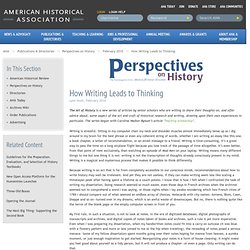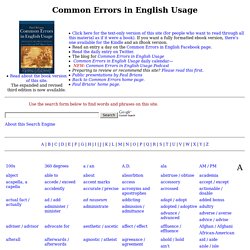

WritingGoodHistoryPaper. Reading, Writing, and Researching for History: – A Guide for College Students by Patrick Rael, Bowdoin College. For all who have taken history courses in college, the experience of writing a research paper is etched indelibly in memory: late nights before the paper is due, sitting in pale light in front of a computer monitor or typewriter, a huge stack of books (most of them all-too-recently acquired) propped next to the desk, drinking endless cups of coffee or bottles of Jolt cola.

Most of all, we remember the endless, panicked wondering: how on earth was something coherent going to wind up on the page – let alone fill eight, or ten, or twelve of them? After wrestling with material for days, the pressure of the deadline and level of caffeine in the body rise enough, and pen is finally put to paper. Many hours later, a paper is born – all too often something students are not proud to hand in, and something professors dread grading. “Whatever does not kill us makes us stronger.” While Nietzsche may sometimes have been right, he likely did not have writing history papers in mind. Phew! 1.b. 1.c. Writing Resources. Writing a Paper. A Blog about Academic Writing. Writing Resources. Richtlijnen voor het uitgeven van historische bescheiden. How Writing Leads to Thinking. The Art of History is a new series of articles by senior scholars who are willing to share their thoughts on, and offer advice about, some aspect of the art and craft of historical research and writing, drawing upon their own experiences in particular.

The series began with Caroline Walker Bynum’s article "Teaching Scholarship". Writing is stressful. Sitting in my computer chair my neck and shoulder muscles almost immediately tense up as I dig around in my brain for the best phrase or even any coherent string of words, whether I am writing an essay like this one, a book chapter, a letter of recommendation, or an email message to a friend. Writing is time-consuming. It’s a great way to pass the time on a long airplane flight because you lose track of the passage of time altogether. Because writing is an act that is far from completely accessible to our conscious minds, recommendations about how to write history may well be irrelevant. Seven upgrade strategies for a problematic article or chapter — Advice for authoring a PhD or academic book. Do one thing well.

Flatten the structure. Say it once, say it right. Instant Grammar Check - Plagiarism Checker - Online Proofreader. Common Errors in English Usage. Use the search form below to find words and phrases on this site.

About this Search Engine E e.g. / i.e. Each early adapter earmarks / hallmark earth, moon easedrop ecology / environment economic / economical ecstatic ect. -ed / -t edge on eek / eke efforting ei / ie either / or, neither / nor either are / either is eighteen hundreds / nineteenth century electrocute elegy / eulogy elicit / illicit ellipses email embaress emergent / emergency emigrate / immigrate eminent / imminent / immanent empathy / sympathy emphasize on emulate / imitate end result enamored by endemic / epidemic engine / motor English / British enjoy to enormity / enormousness enquire / inquire ensuite ensure / insure enthuse entomology / etymology envelop / envelope envious / jealous enviroment epic / epoch epicenter epigram / epigraph / epitaph / epithet epitomy eponymous equally as equivocate / equal -er / -est error / err -es espouse / expound / expand et al.
Zotero. Onderzoekgids Geschiedenis. Versie 3.2 (oktober 2011) Eindredactie Jacco Pekelder Edwin van der Veldt Teksten Judith Amsenga Bas von Benda-Beckmann Els Kloek Edwin van der Veldt Onderzoekgids Geschiedenis Deze onderzoekgids geeft een beknopte inleiding in het historisch vakmanschap.

De gids bespreekt alle facetten van historisch onderzoek ongeacht het onderwerp, met voorbeelden uit studies naar de Nederlandse geschiedenis. De gids is geschreven als praktische handleiding voor de (geschiedenis)student die voor het eerst een historisch onderzoek doet waarbij hij of zij zèlf het onderwerp kiest en literatuur zoekt. Wat voor soort schrijver ben jij? - TAALwinkel. De toets is nagekeken!

Controleer je score en bekijk bij iedere vraag de feedback. Subcategorie 1: Gedrag / houding bij het schrijven Waarschijnlijk belemmeren je manier van werken en/of je kijk op het schrijven je bij het produceren van een tekst. Schrijven is een complexe taak. Je moet inhoud bedenken, informatie logisch ordenen, de juiste schrijfstijl en correct taalgebruik hanteren etc. Je zou misschien nog iets optimaler kunnen werken. Schrijfwijzer. Taaladvies.net. Genootschap Onze Taal.